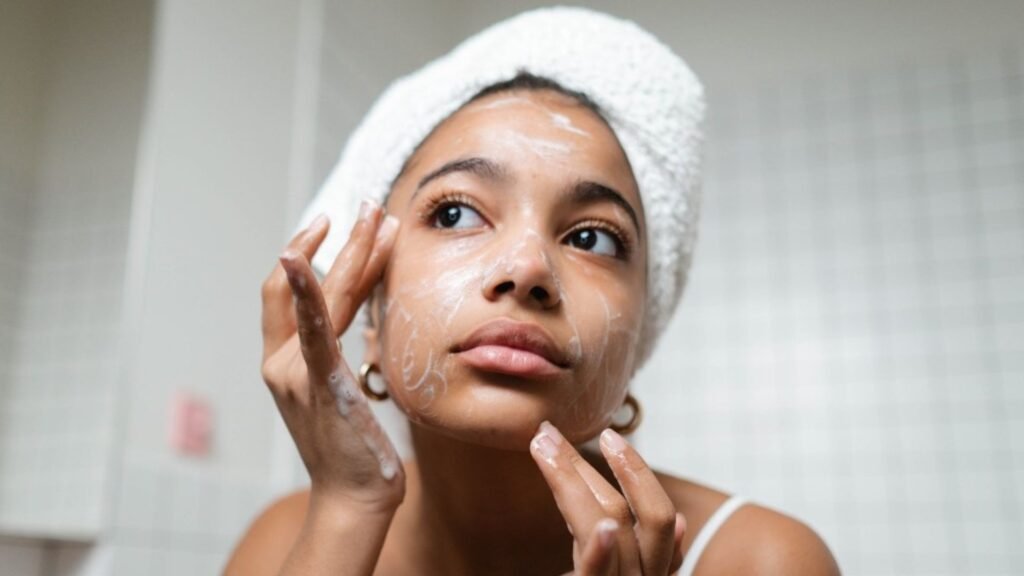Building a personalized skincare routine can make a big difference in how your skin looks and feels. Everyone’s skin is different, so what works for one person might not work for another. By creating a skincare routine tailored to your specific needs, you can achieve healthier, more radiant skin. Here’s how to build a personalized skincare routine step by step.

Know Your Skin Type
The first step in building a personalized skincare routine is to understand your skin type. Skin types generally fall into categories like oily, dry, combination, sensitive, or normal. To determine your skin type, wash your face with a gentle cleanser and let it air dry. After an hour, observe how your skin feels and looks:
- Oily Skin: Your skin appears shiny, especially in the T-zone (forehead, nose, and chin).
- Dry Skin: Your skin feels tight, rough, or flaky.
- Combination Skin: Your skin has both oily and dry areas.
- Sensitive Skin: Your skin may be prone to redness, itching, or irritation.
- Normal Skin: Your skin feels balanced, not too oily or dry.
Identify Your Skin Concerns
Once you know your skin type, the next step is to identify your skin concerns. Common concerns include acne, aging, pigmentation, or dehydration. Consider what specific issues you want to address:
- Acne: Look for products with ingredients like salicylic acid or benzoyl peroxide.
- Aging: Focus on ingredients like retinoids, vitamin C, and hyaluronic acid.
- Pigmentation: Products with niacinamide or glycolic acid can help.
- Dehydration: Choose hydrating ingredients like hyaluronic acid or glycerin.
Choose the Right Products
Based on your skin type and concerns, select products that cater to your needs. A basic skincare routine typically includes:
- Cleanser: Choose a cleanser that suits your skin type. Gel cleansers are good for oily skin, while cream cleansers are better for dry skin.
- Toner: A toner can help balance your skin’s pH and remove any leftover residue.
- Serum: Serums are concentrated treatments for specific concerns like acne or aging.
- Moisturizer: Moisturizers help keep your skin hydrated. Use a lightweight formula for oily skin and a richer one for dry skin.
- Sunscreen: Protecting your skin from the sun is crucial. Opt for a broad-spectrum sunscreen with at least SPF 30.
Establish a Routine
With your products in hand, it’s time to establish a routine. A basic skincare routine usually involves:
- Morning:
- Cleanse your face.
- Apply toner (if using).
- Apply serum.
- Moisturize.
- Apply sunscreen.
- Evening:
- Cleanse your face.
- Apply toner (if using).
- Apply serum.
- Moisturize.
Adjust your routine based on your needs. For instance, if you use treatments like retinoids, apply them in the evening after cleansing.
Test and Adjust
Building a personalized skincare routine is not a one-size-fits-all approach. It’s important to test the products and adjust as needed. Introduce new products gradually and observe how your skin responds. If you experience irritation or other issues, stop using the product and consult a dermatologist if necessary.
Be Consistent
Consistency is key to seeing results from your skincare routine. Stick to your routine daily and be patient. Skincare improvements can take time, so give your routine a few weeks to show effects.
Conclusion
In conclusion, building a personalized skincare routine involves understanding your skin type, identifying your skin concerns, choosing the right products, and establishing a consistent routine. By tailoring your skincare routine to your unique needs, you can achieve healthier, more radiant skin. Remember, skincare is a journey, and finding what works best for you might take some time. Stick with it, and enjoy the process of discovering the perfect routine for your skin.




